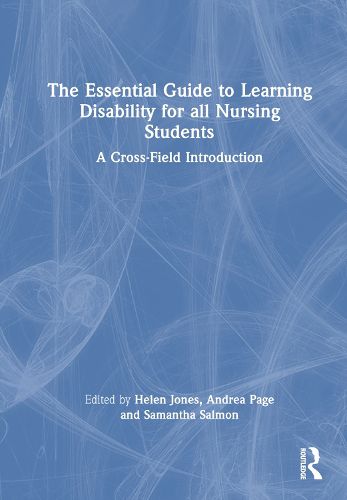Readings Newsletter
Become a Readings Member to make your shopping experience even easier.
Sign in or sign up for free!
You’re not far away from qualifying for FREE standard shipping within Australia
You’ve qualified for FREE standard shipping within Australia
The cart is loading…






This essential text presents the core information that all nursing students and apprentices along with other key health and social care professions, regardless of field, need to know about caring for people with a learning disability and autism. It outlines some of the key challenges faced by people with a learning disability and autism, and ways in which good care can improve their quality of life. People with a learning disability and autism are more likely to need support with aspects of everyday life, be marginalised within society, including within health and social care, and die younger than the rest of the population. They are also more likely to have additional communication needs, sensory processing difficulties and require significant support to access healthcare as well as other opportunities across the course of their lives.
This innovative text highlights the core knowledge that all health and social care professionals need and emphasises the benefits of learning across different fields of practice. It presents information about common conditions, key skills, and where a standard approach may need to be changed when caring for a person with a learning disability and autistic people. It demystifies key issues and commonly misunderstood concepts and topics including distressed behaviours, consent and reasonable adjustments. The book also focuses on addressing health inequalities, improving communication, understanding mental capacity and presents case studies throughout to illustrate how care can and should be delivered.
Written for all who aspire to understand the needs of these individuals and to deliver care as effectively as possible, this collaborative text brings together the voices of services users and their families and carers, with those of nurses, other health professionals, lecturers, and nursing students and apprentices.
$9.00 standard shipping within Australia
FREE standard shipping within Australia for orders over $100.00
Express & International shipping calculated at checkout
This essential text presents the core information that all nursing students and apprentices along with other key health and social care professions, regardless of field, need to know about caring for people with a learning disability and autism. It outlines some of the key challenges faced by people with a learning disability and autism, and ways in which good care can improve their quality of life. People with a learning disability and autism are more likely to need support with aspects of everyday life, be marginalised within society, including within health and social care, and die younger than the rest of the population. They are also more likely to have additional communication needs, sensory processing difficulties and require significant support to access healthcare as well as other opportunities across the course of their lives.
This innovative text highlights the core knowledge that all health and social care professionals need and emphasises the benefits of learning across different fields of practice. It presents information about common conditions, key skills, and where a standard approach may need to be changed when caring for a person with a learning disability and autistic people. It demystifies key issues and commonly misunderstood concepts and topics including distressed behaviours, consent and reasonable adjustments. The book also focuses on addressing health inequalities, improving communication, understanding mental capacity and presents case studies throughout to illustrate how care can and should be delivered.
Written for all who aspire to understand the needs of these individuals and to deliver care as effectively as possible, this collaborative text brings together the voices of services users and their families and carers, with those of nurses, other health professionals, lecturers, and nursing students and apprentices.